Using UMPLE
-
Optional:
-
UMPLE in Eclipse
-
cmake and gcc for compiling C++ code
-
UMPLE Philosophy
UMPLE Philosophy 1-4
-
P1. Modeling is programming and vice versa
-
P2. An UMPLE programmer should never need to edit generated code to accomplish any task.
-
P3. The UMPLE compiler can accept and generate code that uses nothing but UML abstractions.
- The above is the inverse of the following
-
P4. A program without UMPLE features can be compiled by an UMPLE compiler.
- e.g. input Java results in the same as output
UMPLE Philosophy 5-8
-
P5. A programmer can incrementally add UMPLE features to an existing program
- Umplification
-
P6. UMPLE extends the base language in a minimally invasive and safe way.
-
P7. UMPLE features can be created and viewed diagrammatically or textually
-
P8. UMPLE goes beyond UML
UMPLE Class Modeling
UMPLE Class Models - Quick Overview
-
Key elements:
-
Classes
-
Attributes
-
Associations
-
Generalizations
-
Methods
-
-
We will look at all these using examples via UMPLE ONLINE
-
UMPLE code/models are stored in files with suffix .ump
Exercise: Compiling and changing a model
-
Look at the example at the bottom of
- http://helloworld.UMPLE.org (also on next slide)
- Observe: attribute, association, class hierarchy, mixin
- http://helloworld.UMPLE.org (also on next slide)
-
Click on Load the above code into UMPLEOnline
- Observe and modify the diagram
- Add an attribute
- Make a multiplicity error, then undo
- Generate code and take a look
- Download, compile and run if you want
Hello World Example 2 in the User Manual
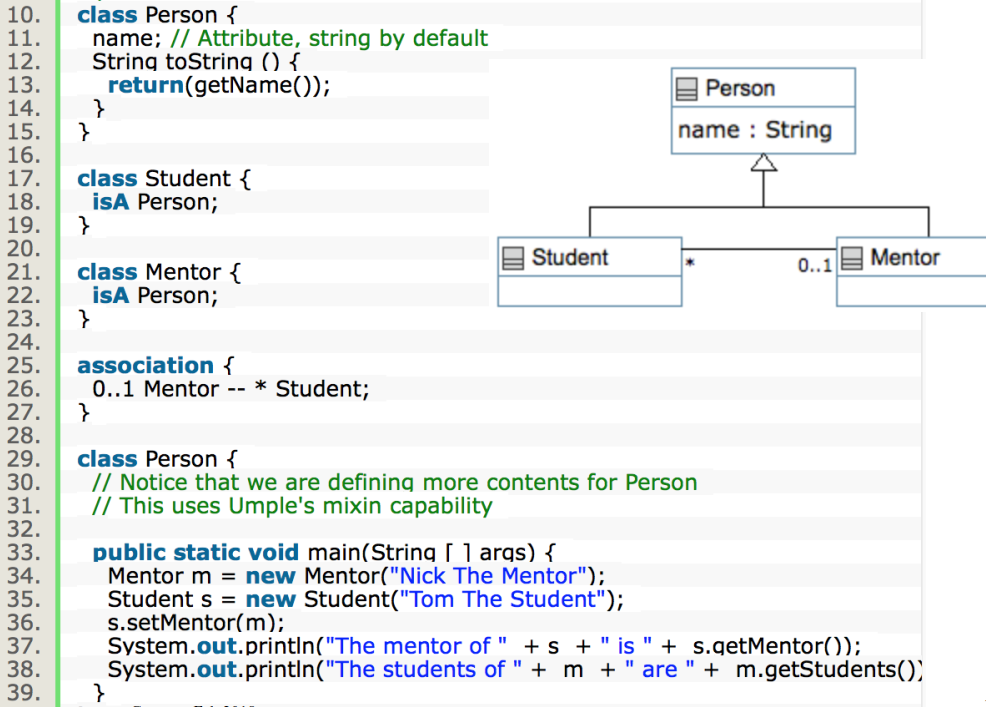
Key tools:
- UMPLE Online
- Command-Line
- User Manual
Hello World example 2 in UMPLEOnline
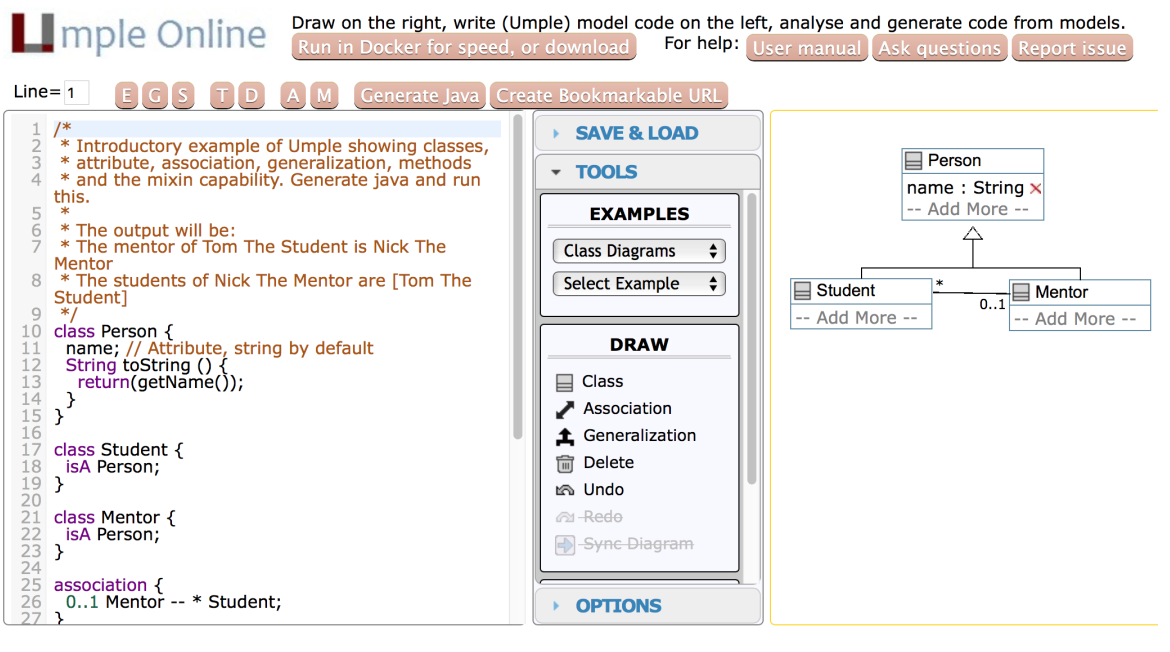
Exploration of UMPLEOnline
- Explore class diagram examples
- Options
TorControl-t(hide and show text)DorControl-d(hide and show diagram)A,Mto hide and show attributes, methods- Default diagram types
G/Control-g(Graphviz),S/Control-s(State Diagram)E/Control-e(Editable class diagram)
- Generate code and look at the results
- In UMPLE you never should modify generated code
- It is designed to be readable for educational purposes
Use of the UMPLEOnline Docker image
-
UMPLE’s server can handle
80,000transactions per hour- Code generations, edits
-
But needs a good Internet connection
(sometimes hundreds of students have assignments due) -
To maximize speed of UMPLEOnline run it in your local machine:
- Follow the instructions at http://docker.UMPLE.org
Demo of compiling on the command line
- To compile on the command line you will need Java 8
- Download UMPLE from http://dl.UMPLE.org
- Basic compilation
java -jar UMPLE.jar model.ump
- Help for features and commands
java -jar UMPLE.jar --help
- To generate and compile the java to a final system
java –jar UMPLE.jar model.ump -c -
Quick walkthrough of the user manual
Note in particular
- Key sections:
- attributes,
- associations,
- state machines
- Grammar
- Generated API
- Errors and warnings
- Editing pages in github
UMPLE Attributes
- More than just variables
Attributes
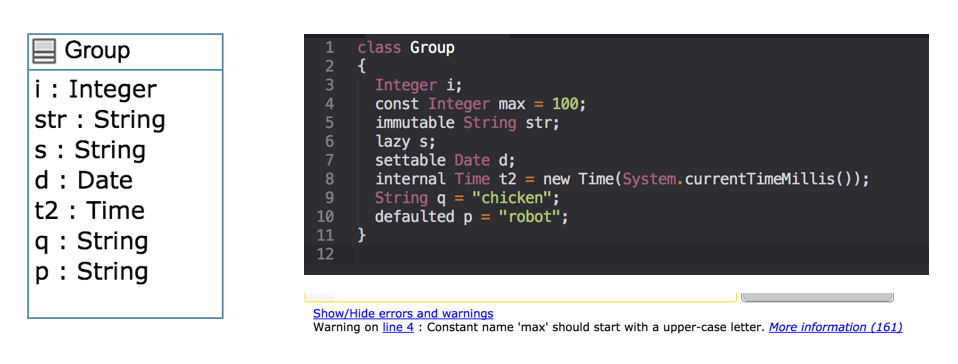
Attributes Exercise #1
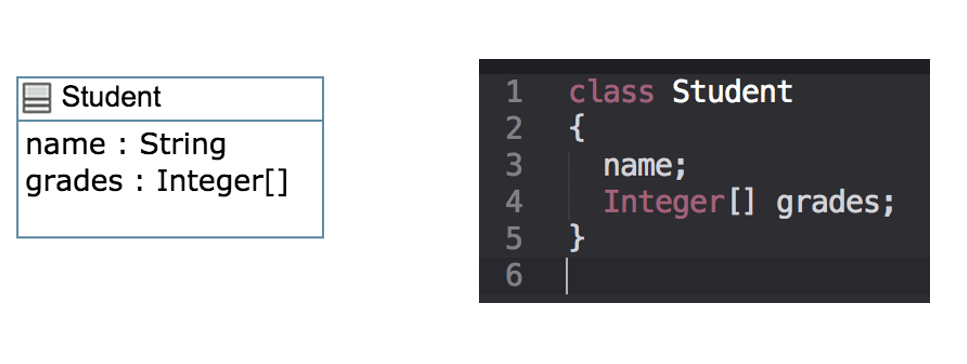
Attributes
-
"Instance variables"
- Part of the state of an object
- Simple data that will always be present in each instance
-
Specified like a Java or C++ field or member variable
-
But, intended to be more abstract!
- Example, with an initial value
a = "init value";
Attributes
-
As in UML, more abstract than instance variables
-
Always private by default
-
Should only be accessed get, set methods
-
Can be stereotyped (upcoming slides) to affect code generation
-
Can have aspects applied (discussed later)
-
Can be constrained (discussed later)
-
Code generation from attributes
- Default code generation
- Generates a
getName()andsetName()method fornamepublic
- Generates a
- Creates an arguments in the class constructor by default
- An attribute is
privateto the class by default- Should only be accessed get, set methods
Code Generation (JavaDocs)
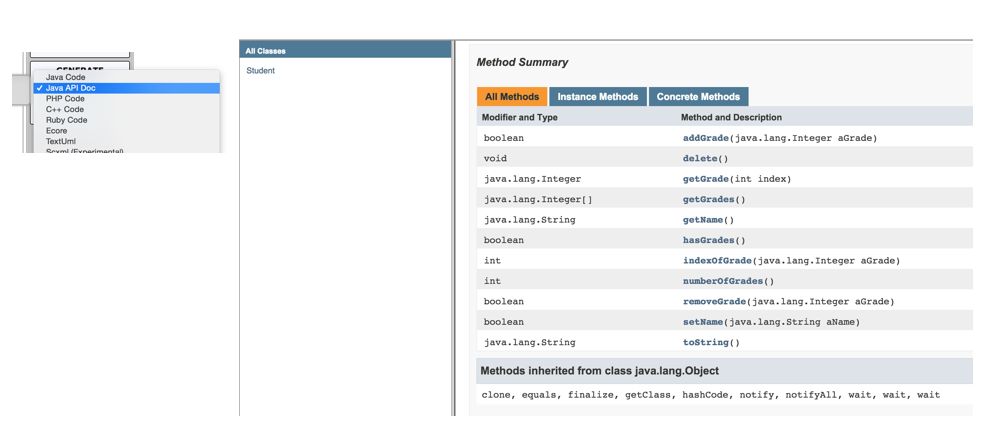
Code Generation Patterns
-
Attributes
- Set/Get (UB = 1)
- Add/Remove/NumberOf/IndexOf/Get (UB > 1)
- Lazy immutability
- Default values
- Constants
- Before / After cod
UB = upper bound
Code Generation Patterns
-
Associations
- Set/Get (UB = 1)
- Add/Remove/NumberOf/IndexOf/Get (UB > 1)
- Referential Integrity
- Multiplicity Constraints
- 42 different cases
UB = upper bound
Code Generation (Semantics)
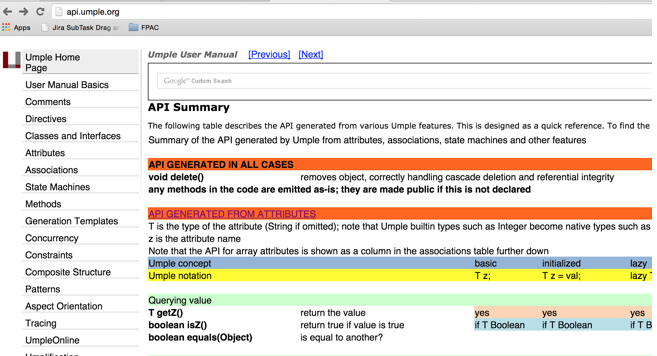
UMPLE builtin datatypes
String // (default if none specified)
Integer
Float
Double
Boolean
Time
Date
- The above will generate appropriate code in Java, C++ etc.
- e.g. Integer becomes int
- Other (native) types can be used but without guaranteed correctness
Attribute stereotypes (1)
- Code generation can be controlled through stereotypes:
- lazy - don’t add a constructor argument
lazy b; // sets it to null, 0, “” depending on type
- Defaulted – can be reset
defaulted s = "def"; // resettable to the default
Attribute stereotypes (2)
- autounique – provide a unique value to each instance
autounique x; // sets attribute to 1, 2, 3 …
- internal – don’t generate any methods
internal i; // doesn’t generate any get/set either
Immutability
-
Useful for objects where you want to guarantee no possible change once created
- e.g. a geometric point
-
Generate a constructor argument and get method but no set method
immutable String str;
- No constructor argument, but allows setting just once.
lazy immutable z;
Lets explore attributes by example
Derived attributes
- These generate a get method that is calculated.
class Point
{
// Cartesian coordinates
Float x;
Float y;
// Polar coordinates
Float rho =
{Math.sqrt(Math.pow(getX(), 2) + Math.pow(getY(), 2))}
Float theta =
{Math.toDegrees(Math.atan2(getY(),getX()))}
}
Multi-valued attributes
- Limit their use. Associations are generally better.
class Office {
Integer number;
Phone[] installedTelephones;
}
class Phone {
String digits;
String callerID;
}
Keys
- Enable UMPLE to generate an
equals()and ahashcode()method
class Student {
Integer id;
name;
key { id }
}
- The user manual has a sports team example showing keys on associations too
- Note how this feature is not inherited from UML
UMPLE Generalization and interfaces
Generalization in UMPLE
- UMPLE uses the
isAkeyword to indicate generalization - Used to indicate
superclass, usedtrait, implementedinterface
class Shape {
colour;
}
class Rectangle {
isA Shape;
}
Avoiding unnecessary generalizations
-
Inappropriate hierarchy of Classes
-
What should the model be?
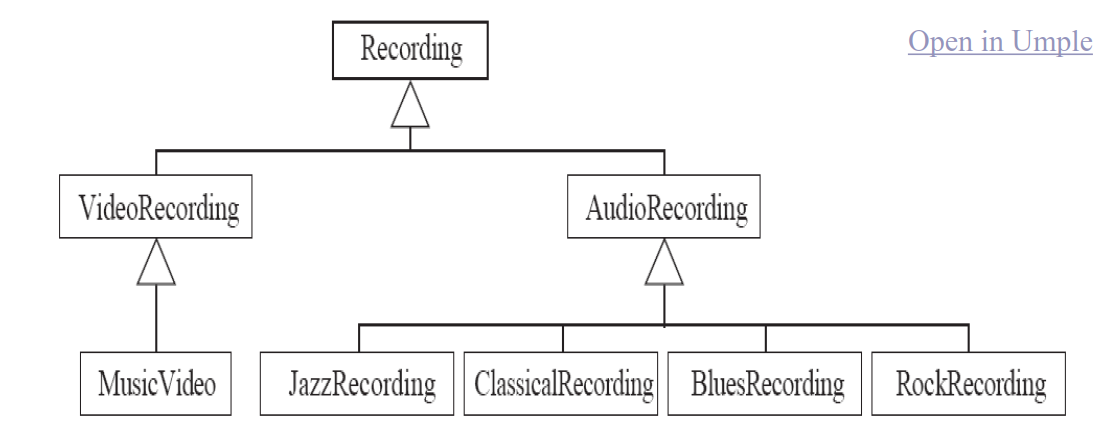
Interfaces
-
Declare signatures of a group of methods that must be implemented by various classes
-
Also declared using the keyword
isA -
Essentially the same concept as in Java
-
Let’s explore examples in the user manual …
UMPLE Methods
User-written Methods in UMPLE
-
Methods can be added to any UMPLE code.
-
UMPLE parses the signature only; the rest is passed to the generated code.
-
You can specify different bodies in different languages
-
We will look at examples in the user manual …
UMPLE Associations
-
- Notice the inline and independent state machines
Associations
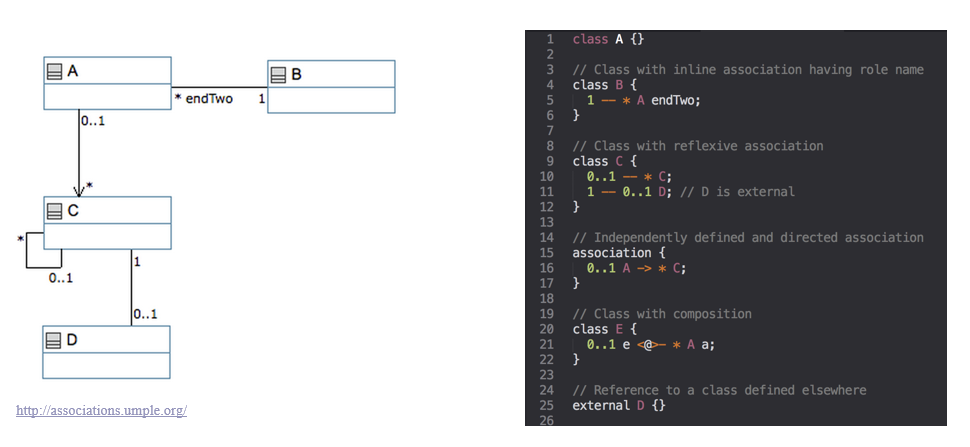
Associations Exercise #1
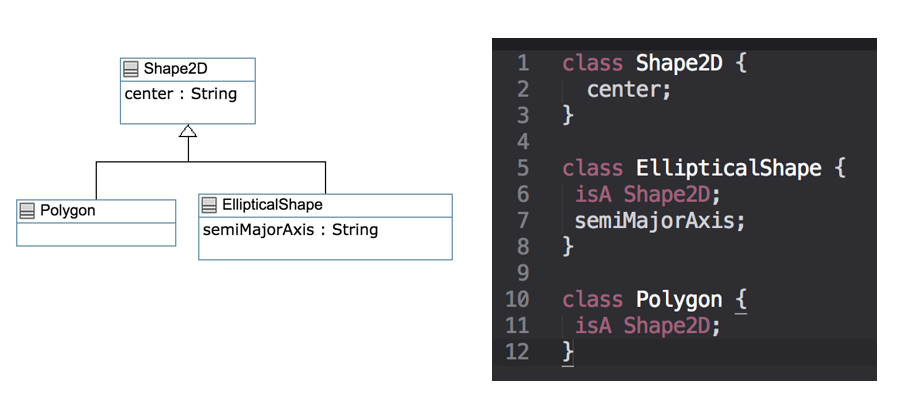
Associations Exercise #2
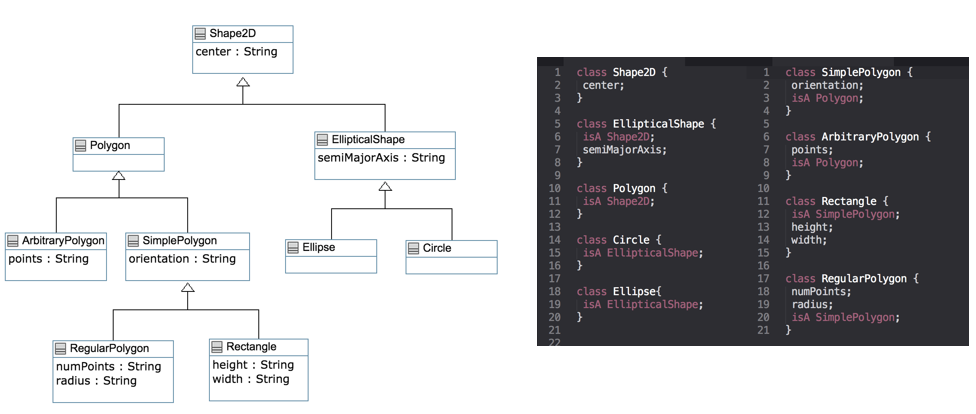
Associations
- Describe how instances of classes are linked at runtime
- Bidirectional
--or - Unidirectional
->
- Bidirectional
- Multiplicity:
- Bounds on the number of linked instances
*Or0..*0 or more1..*1 or more1Exactly 12Exactly 21..3Between 1 and 30..2Up to 2
Association Relationships

Association Relationships
- Directional Associations
* -> 0..1, * -> 1, * -> *, * -> m..n, * - >n, *->m..* and*->0..n.
- Symmetric Reflexive
0..1, 0..n, *, 1, n, m..n,m..*
Basic UML associations
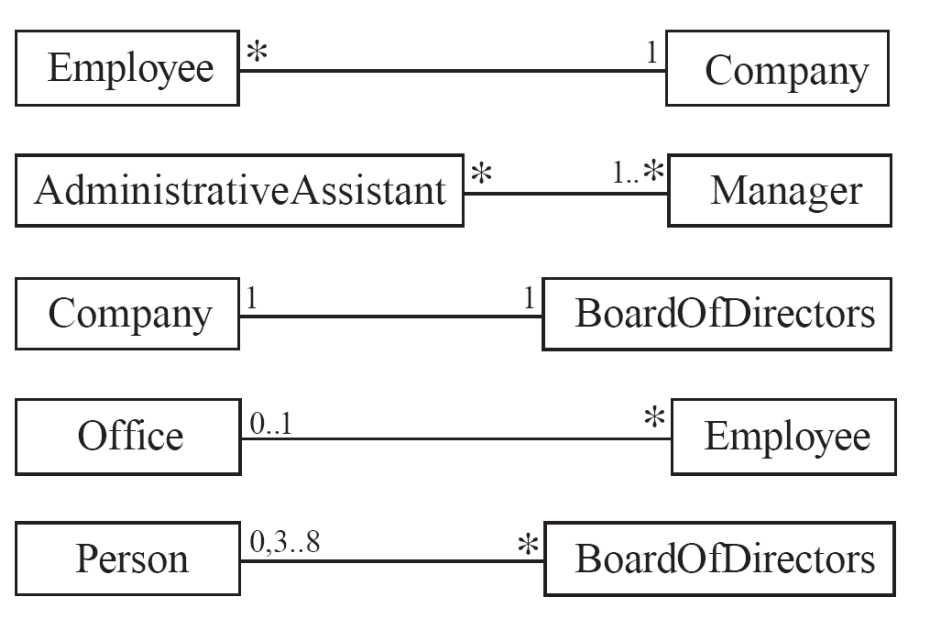
Many-to-one associations (1)
class Employee {
id;
firstName;
lastName;
}
class Company {
name;
1 -- * Employee;
}
Many-to-one associations (2)
- A company has many employees,
- An employee can only work for one company.
- This company will not store data about the moonlighting activities of employees!
- A company can have zero employees
- E.g. a ‘shell’ company
- It is not possible to be an employee unless you work for a company
- Let’s draw and write this in UMPLEOnline:

Role names (optional, in most cases)
- Allow you to better label either end of an association
class Person{
id;
firstName;
lastName;
}
class Company {
name;
1 employer -- * Person employee;
}
Referential Integrity
-
When an instance on one side of the association changes
-
The linked instances on the other side know …
-
And vice-versa
-
-
This is standard in UMPLE associations, which are
bidirectional
Many-to-Many Associations
- An assistant can work for many managers
- A manager can have many assistants
- Assistants can work in pools working for several managers
- Managers can have a group of assistants
- Some managers might have zero assistants.
- Is it possible for an assistant to have, perhaps temporarily, zero managers?

One-to-One Associations (Use cautiously)
- For each company, there is exactly one board of directors
- A board is the board of only one company
- A company must always have a board
- A board must always be of some company

Typical erroneous use of one-to-one
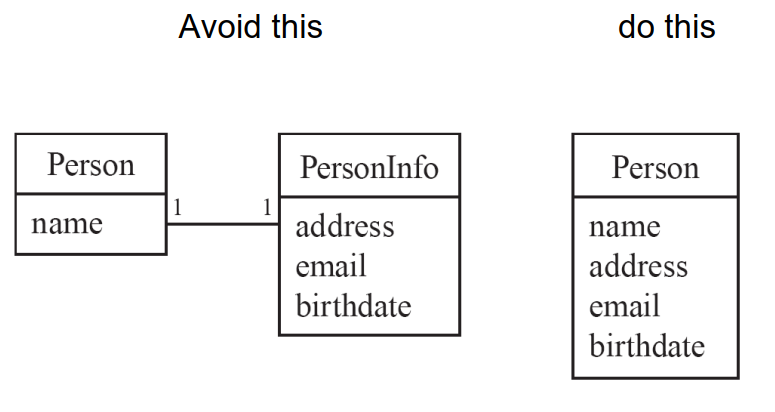
Unidirectional Associations
- Associations are by default bi-directional
- It is possible to limit the direction of an association by adding an arrow at one end
- In the following unidirectional association
- A Day knows about its notes, but a Note does not know which Day is belongs to
- Note remains ‘uncoupled’ and can be used in other contexts
class Day {
* -> 1 Note;
}
class Note {}

Association Classes
- Sometimes, an attribute that concerns two associated classes cannot be placed in either of the classes
and Extended Example

- The following are nearly equivalent
- The only difference:
- in the association class there can be only a single registration of a given Student in a CourseSection
- The only difference:
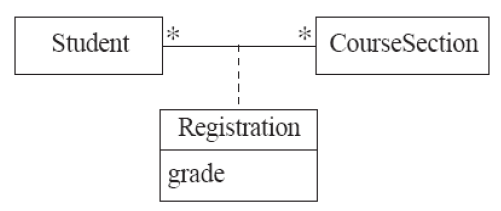
Association classes (cont.)
- UMPLE code
class Student {}
class CourseSection {}
associationClass Registration {
* Student;
* CourseSection;
}
- Open in UMPLEOnline, and then generate code
Reflexive Associations
- An association that connects a class to itself

class Course {
* self isMutuallyExclusiveWith; // Symmetric
}
association {
* Course successor -- * Course prerequisite;
}
Inline vs. Standalone associations
- The following are equivalent to allow flexibility:
class X {}
class Y {
1 -- * X;
}
class X {}
class Y {}
association {
1 Y -- * X;
}
Aggregation
- Aggregations are ordinary associations that represent part-whole relationships.
- The 'whole' side is often called the assembly or the aggregate
- This is a shorthand for association named
isPartOf - UMPLE has no special syntax currently

class Vehicle {
1 whole -- * VehiclePart part;
}
class VehiclePart{
}
Composition
- A composition is a strong kind of aggregation
- If the aggregate is destroyed, then the parts are destroyed as well

class Building {
1 <@>- * Room;
}
class Room{
}
Sorted Associations
- Order objects in the association according to a specific key
class Academy {
1 -- * Student registrants sorted {id};
}
class Student {
Integer id;
name;
}
- We will look at a more complete example in the User Manual
A final word on associations
- More help and examples are in the user manual online at
References
References